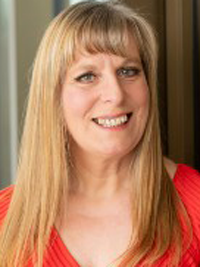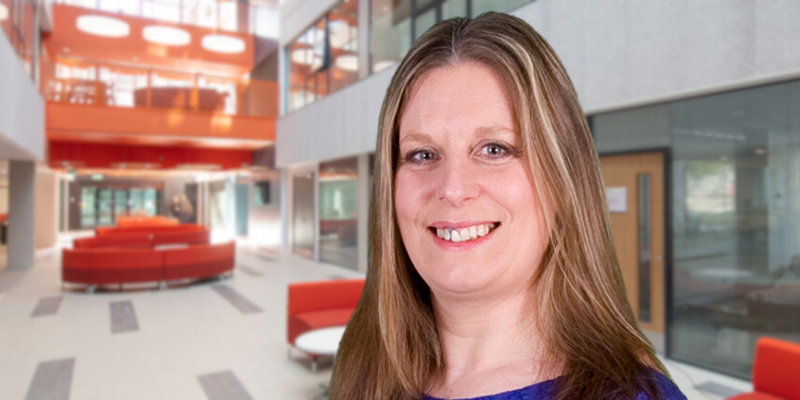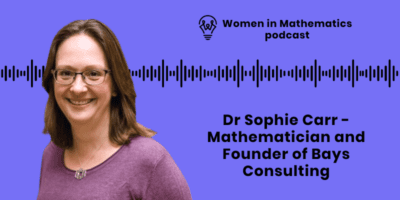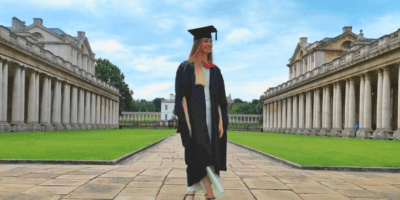Dr Martine Barons is a mathematician who is the director of the Applied Statistics & Risk Unit within the Statistics Department at the University of Warwick. Martine’s research is focussed on decision-making under uncertainty and structured expert judgement, with applications in household food security, pollination, digital archives and the energy sector. Martine is a Chartered Mathematician, a Fellow of the Institute of Mathematics and its Applications, a member of the Royal Statistical Society and a senior fellow of the Higher Education Academy.

“Academia is a very special place to work because you can always hear different languages and different ideas being discussed, and you can understand something about countries you’ve never visited because you get to know colleagues from all around the world.”
Discovering my passion for statistics: Better late than never
Back in 2016, I came to academia rather later in life than is usual, getting my PhD at the grand old age of 52. (You can read about my journey and previous career history in the first article I wrote for Womanthology.)
A life academic
As director of the Applied Statistics & Risk Unit at the University of Warwick, my day-to-day work involves a number of things — it’s very varied and interesting. One thing I might well be doing is, like any academic, sitting in silence and solitude, and doing some really hard thinking about an unsolved problem, and then either devising a strategy to solve it or actually delivering the solution itself.
At this point I will usually go and discuss it with colleagues, to test my ideas and see if they make sense. My colleagues very often have interesting ideas of their own to add or they might know somebody working in a similar area who it might be relevant for me to check out — that’s how science moves forward.
Another thing I might be doing is interacting with business, government or industry — maybe they have contacted me because they’ve heard of work we’ve done with other businesses, or perhaps I will be contacting them to showcase our expertise and experience working with local councils, large quangos or commercial businesses.
I focus on evidence-informed decision making, and building decisions support tools based on data. One piece of research I have done recently is in collaboration with the National Archives, where we built a decision support tool that enabled them to put together a business case about how to preserve digital resources.

As most people will know, the National Archives has been preserving paper and physical resources for a very long time, and they are experts at that, but things that are created digitally have a whole different set of risks and problems to be avoided in order to keep them safe for a long period. So, we did some work together to identify and quantify the risks involved, and then to uncover the relationship between those risks, as well as how they interact together. We then built a tool for them, which is now being used worldwide.
Diversity enriches the research landscape
Diversity is vitally important in mathematics, and indeed in any organisation. But it’s the diversity of ideas people have, coming from different perspectives because they have walked their own path, whether that’s an academic journey, in terms of the particular modules that they chose, or the studies that they undertook, or the previous projects and research ideas that they’ve explored.
Or it might be because they have experienced a different kind of life, perhaps coming to the UK from a different country, or just having a different life experience, so diversity really enriches the research landscape.
Academia is a very special place to work because you can always hear different languages and different ideas being discussed, and you can understand something about countries you’ve never visited because you get to know colleagues from all around the world.
Championing inclusion
The Statistics department is doing a great many things to support inclusion and it’s being very successful — we’ve been awarded the Athena SWAN Silver Award, and several people who have become professors recently are women, so the number of female colleagues who are the highest level has increased enormously.
There’s plenty of work going on in terms of undergraduates as well when it comes to making people feel supported and included. The student staff liaison committees are held in very high regard in relation to their role in this work.
Using numeracy skills to navigate life in a confident and competent way

In terms of post-16 mathematics, the key here is to tap into things that people are already interested in. I think most of us are interested in not getting conned by a credit card or a loan company, so that can be a strong motivator to understand the arithmetic behind compound interest, for example.
I think that a lot of us are interested in day-to-day things like budgeting and getting the best deal so those can be ways to try and make sure people are sufficiently numerate to navigate life in a confident and competent way.
Coming up next
I already have a lot of interesting projects which are coming toward completion and another raft of projects which are just starting. In the early stages projects are always exciting we don’t know quite what we’re going to find along the way.
There are some urgent needs to be addressed in my area of research, not least how do we make good decisions that help people who might be food insecure and struggling to eat, particularly during these times of crisis when food prices are rising. At times like these, local authorities don’t have huge uplifts in spending or access to the evidence they need in order to address problems in ways that will actually work. We need to know what the evidence says, and that’s what I’m beginning to work on now.





